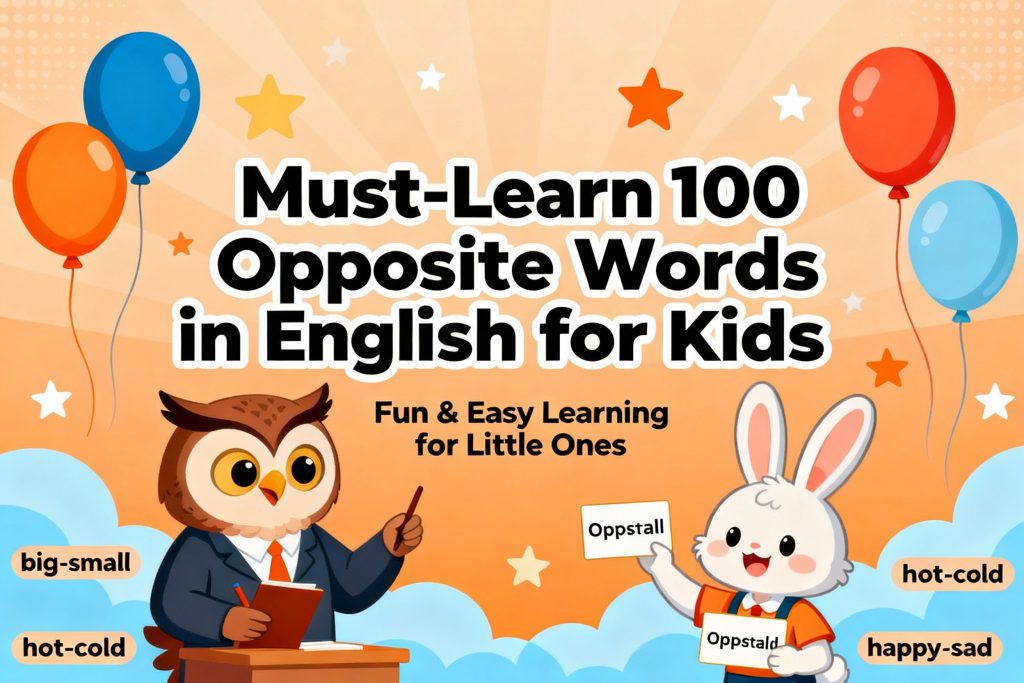Learning new words is like opening a door to a bigger world. When kids learn opposite words—also called antonyms—they understand contrasting ideas more clearly and can express themselves better. Opposite words are pairs of words that have completely different meanings, such as “big” and “small.” Knowing them helps children build vocabulary, think critically, and communicate with confidence.
This article offers 100 essential opposite words for kids, complete with examples and tips to make learning fun!

What Are Opposite Words?
Opposite words (antonyms) are pairs of words that express contrasting meanings. Instead of just saying “not” before a word, antonyms give a precise opposite meaning. For example, the opposite of “empty” is “full,” not “not empty.” Learning these opposites improves kids’ language skills and helps them understand the world better.
Why Opposite Words Are Important for Kids
- Boosts cognitive skills: Helps children think critically by comparing and understanding differences.
- Builds a stronger vocabulary: Kids learn many ways to describe things.
- Improves communication: Using exact words, including opposites, makes the expression clear.
- Supports reading and writing: Recognizing opposites helps in comprehension and enhances writing skills.
- Enhances problem-solving: Understanding contrasts aids logical reasoning applicable in many subjects.
| Word | Opposite | Example Sentence |
|---|---|---|
| 1. Good | Bad | The painting was beautiful, but it later looked ugly. |
| 2. Thin | Fat | The cat was thin, but now looks fat. |
| 3. Beautiful | Ugly | This tool is useful; that one is useless. |
| 4. Fast | Slow | The car is fast, but the bike is slow. |
| 5. Useful | Useless | This box is small, but that one is big. |
| 6. Bright | Dark | The morning is bright, the night is dark. |
| 7. In | Out | I went in and came out of the room. |
| 8. Honest | Dishonest | She is honest, unlike the dishonest boy. |
| 9. Start | End | The race will start soon and end late. |
| 10. Opposite | Same | They sat on opposite sides, then on the same bench. |
| 11. Open | Close | Open the door; close it afterward. |
| 12. Small | Big | The shoe was tight, but now it’s loose. |
| 13. Love | Hate | I love dogs but hate cats. |
| 14. Wet | Dry | My shirt is wet, but the pants are dry. |
| 15. More | Less | Eat more, don’t eat less. |
| 16. Up | Down | Look up and then look down. |
| 17. Early | Late | I woke up early but arrived late. |
| 18. Healthy | Sick | She was healthy but became sick. |
| 19. Left | Right | Turn left here, then right. |
| 20. Front | Back | The kids sat in the front and back rows. |
| 21. Male | Female | He is male, she is female. |
| 22. Infant | Adult | I was an infant and now an adult. |
| 23. Truth | Lie | Tell the truth, not a lie. |
| 24. Neat | Dirty | The room was neat, then got dirty. |
| 25. Polite | Impolite | Be polite, not impolite. |
| 26. Tight | Loose | The knife is sharp; the other is blunt. |
| 27. Sharp | Blunt | The soup is hot, but the milk is cold. |
| 28. Play | Work | After playtime, it’s time to work. |
| 29. Addition | Subtraction | Math has addition and subtraction. |
| 30. Hot | Cold | I live in the north, and she is from the south. |
| 31. Far | Near | The store is far and my home is near. |
| 32. East | West | The sun rises in the east and sets in the west. |
| 33. North | South | All students came; none stayed home. |
| 34. Always | Never | Always try your best, never give up. |
| 35. All | None | This game is easy; that one is difficult. |
| 36. Together | Alone | We work together, never alone. |
| 37. Even | Odd | 2 is even, 3 is odd. |
| 38. Empty | Full | The cup is empty, fill it full. |
| 39. Easy | Difficult | The glass is full, I drank half. |
| 40. On | Off | Turn the light on, switch the fan off. |
| 41. Freeze | Melt | Freeze water to ice, then melt it. |
| 42. Solid | Liquid | Ice is solid, water is liquid. |
| 43. Laugh | Cry | Let’s laugh, not cry. |
| 44. Sweet | Bitter | The candy is sweet, the lemon is bitter. |
| 45. Full | Half | You did better today; last time was worse. |
| 46. Question | Answer | Ask a question, give an answer. |
| 47. Day | Night | Day is bright, night is dark. |
| 48. Clever | Stupid | The dog is clever, the cat is stupid. |
| 49. Son | Daughter | He is my son, she is my daughter. |
| 50. Alive | Dead | The tree is alive, the leaf is dead. |
| 51. Begin | Finish | Let’s begin and then finish. |
| 52. Awake | Asleep | He is awake, she is asleep. |
| 53. Above | Below | The lamp is above, the carpet is below. |
| 54. Accept | Reject | Accept invitations politely or reject if busy. |
| 55. After | Before | Brush teeth after dinner, not before. |
| 56. Ancient | Modern | Ancient buildings and modern skyscrapers. |
| 57. Answer | Question | Always answer the question clearly. |
| 58. Arrive | Depart | The train will arrive soon and depart later. |
| 59. Ask | Tell | Ask nicely or tell the truth. |
| 60. Attack | Defend | Soldiers attack enemies, others defend. |
| 61. Beautiful | Ugly | See the beautiful flowers, avoid the ugly weeds. |
| 62. Better | Worse | Stay calm during tests, and avoid getting excited. |
| 63. Big | Small | A whale is big; a fish is small. |
| 64. Black | White | The board is black; the paper is white. |
| 65. Bold | Shy | The bold child spoke loudly, the shy one was quiet. |
| 66. Borrow | Lend | I borrow a book, you lend one. |
| 67. Brave | Cowardly | The knight was brave, the villain cowardly. |
| 68. Bright | Dim | The lamp is bright, the candle dim. |
| 69. Bring | Take | Bring your friends, take your bags. |
| 70. Build | Destroy | We build houses, not destroy them. |
| 71. Buy | Sell | Buy toys, sell old ones. |
| 72. Calm | Excited | The bold child spoke loudly, and the shy one was quiet. |
| 73. Clean | Dirty | Clean your hands, avoid dirty things. |
| 74. Close | Distant | Don’t use damaged toys; play with new ones. |
| 75. Cold | Hot | Ice is cold, tea is hot. |
| 76. Come | Go | Come here, go there. |
| 77. Correct | Wrong | Give the correct answer, avoid wrong ones. |
| 78. Damaged | New | The market is closed, the park is distant. |
| 79. Dark | Light | Dark night, light day. |
| 80. Deep | Shallow | Deep sea, shallow pond. |
| 81. Desert | Oasis | In the desert, find the oasis. |
| 82. Despair | Hope | Never lose hope, avoid despair. |
| 83. Destroy | Create | Don’t destroy memories, create new ones. |
| 84. Different | Same | Different socks, same pair. |
| 85. Dirty | Clean | Dirty hands need washing to be clean. |
| 86. Down | Up | Slide down, climb up. |
| 87. Dry | Wet | Dry clothes, wet umbrella. |
| 88. Early | Late | Early morning, late evening. |
| 89. East | West | East is sunrise, west is sunset. |
| 90. Exit | Entrance | Use the entrance, not the exit. |
| 91. Fail | Succeed | Don’t fear to fail, strive to succeed. |
| 92. False | True | False stories are bad, true ones help. |
| 93. Fast | Slow | Fast runner, slow walker. |
| 94. Find | Lose | Find the treasure, don’t lose it. |
| 95. Finish | Start | Finish homework before you start playing. |
| 96. Follow | Lead | Follow your teacher, don’t lead without knowing. |
| 97. Foolish | Wise | Wise advice beats foolish ideas. |
| 98. Fresh | Stale | Eat fresh fruit, avoid stale bread. |
| 99. Full | Empty | The box is full, the bag empty. |
| 100. Funny | Serious | Tell a funny joke or a serious story. |
Fun Ways to Teach Opposite Words
- Flashcards: Make cards with word pairs and colorful images.
- Games: Play “Opposite Charades” or matching games.
- Storytelling: Use stories that highlight opposite words.
- Songs & Rhymes: Sing songs with antonym pairs.
- Art & Craft: Draw pictures representing opposite words.
- Outdoor Learning: Explore nature for examples like “big” trees and “small” flowers.
Conclusion
Learning 100 opposite words gives kids a strong foundation in English and enhances their thinking skills. With interesting games, stories, and practice, this learning journey can be joyful and memorable. Start using these pairs today to make language learning fun and effective!
